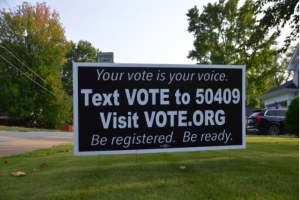Political Issue: A distinguishing decision
October 4, 2020
Much of the nation wrestled with grief the evening of Friday, Sept. 18. In the wake of Supreme Court Justice Ruth Bader Ginsburg’s death, a political fight began to unfold. The power of appointing Supreme Court justices is arguably the most significant impact a president can have on the United States. It is one that lasts past the terms spent in office and Cabinet members. It is one that can actively make a difference for an extended time, historically over 36 years. President Donald Trump has been given the opportunity to nominate three Supreme Court justices, and appointed two. He now has the chance to nominate a third, only six weeks before the November election.
In the time before Ginsburg’s death, the court began to decide cases with a more liberal outcome, despite having a 5-4 conservative majority. During June of 2020, the Supreme Court heard a case regarding a restrictive Louisiana abortion law. Ginsburg, who was known to be an active supporter of women’s rights and abortion rights, sided with the liberal wing in declaring the law unconstitutional. Chief Justice John Roberts Jr., a conservative, joined the four liberal justices, leading to the nullification of the abortion law.
If a sixth conservative justice were appointed, a swing decision as described above would be much less likely. Even if Justice Roberts were to vote left-leaning, that would be significantly less impactful in a new Supreme Court conservative majority of 6-3. Two justices would then be required to stray from party lines, not only Justice Roberts.
This could lead to a conservative dominated Supreme Court deciding cases that have a national influence with right-leaning outcomes. The Court’s makeup is likely to impact decisions on pertinent issues of the modern political climate, such as ones regarding abortion, Planned Parenthood, healthcare, gun control and workplace discrimination toward LGBT individuals.
The late Justice Ginsburg undeniably led a groundbreaking and impactful life. Her passing has left the nation debating whether President Trump should nominate a justice, or wait until after the election. According to a national CNBC poll, 57% of voters think Trump should be unable to nominate a Supreme Court justice if he loses, but he already announced his nomination of Judge Amy Coney Barrett on Saturday, Sept. 26. Many news sources have likened Judge Barrett’s ideology to the late Antonin Scalia. Although Trump’s nomination is known, whether or not the Senate will confirm Barrett is indefinite.



